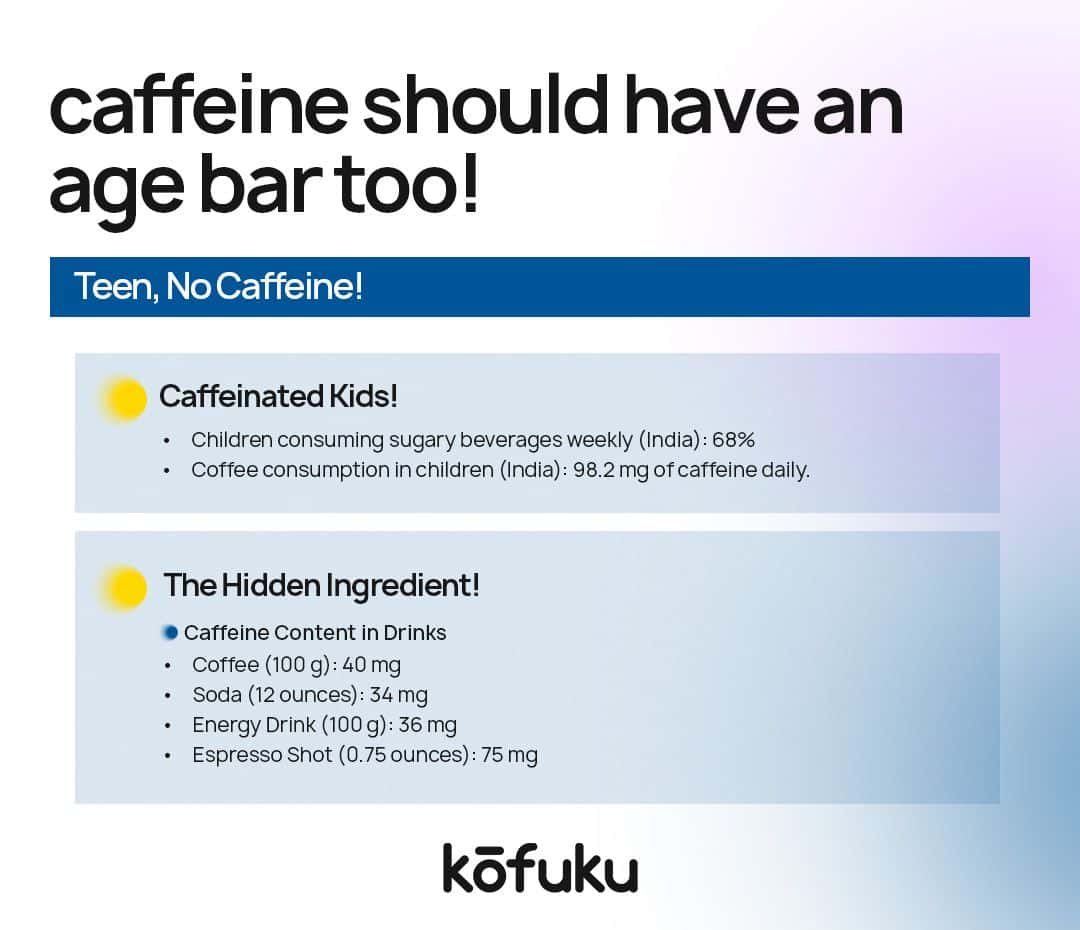Should Our Teens Consume Caffeine Early On?

Introduction
Being a parent is really, really tough. It becomes an especially testing role when your kid has grown past the age where they made faces at your daily cup of coffee and started eyeing them with interest.
Teenage years are a time of change. Their entire life is surrounded completely by external stimulants of bite-sized contents that are made to encourage a short attention span. Caffeine, in its various forms, is also a stimulant that's actively harming them.
If you're looking to find out how caffeine affects your teen’s health, then you're right where you are meant to be. It's a topic that's as stimulating as a double espresso and one that deserves a good, hard look. Solely because what we consume determines our well-being more than anything else.
What Constitutes Consumable Caffeine?
Sun Tzu was right when he said, “If you know the enemy and know yourself, you need not fear the result of a hundred battles.” The Art Of War, though a bit extreme in this scenario, fits perfectly well. Before we get into why caffeine is bad for young teens, let's clarify what we mean by "caffeine."
It's not just the packet of instant coffee you have every morning, not anymore, at least. Caffeine is a sneaky ingredient that hides in various forms:
1. Coffee: The classic source, coffee is a major caffeine contributor, from lattes to cappuccinos.
2. Tea: Yes, you read it right. Black, green, or white – tea contains caffeine, though generally less than coffee.
3. Sodas: Many soft drinks, especially colas, are loaded with caffeine. But that's the lesser of the two evils considering what Coca-Cola added to their drinks before 1903.
4. Energy Drinks: These are the real wild cards. Packed with caffeine, often in alarming amounts, they're a significant concern. With many gaming content creators promoting them left, right and centre, the impact of energy drinks on teens has also increased.
5. Chocolate: Unfortunately, even chocolate bars contain caffeine, albeit in smaller quantities.
6. Certain Medications: Some over-the-counter pain relievers and stimulants also contain caffeine.
With so many of the above products seeing almost daily usage among teens, it's no wonder that parents need to keep their eyes peeled for not only caffeine. Especially energy drinks, as these beverages are often marketed towards teens and promise increased energy, focus, and performance.
But they're a cocktail of caffeine, sugar, and other stimulants, and their effects can be hazardous for young people. A 2023 literature review of the topic talks about multiple studies where energy drinks were associated with a range of health problems in teens, including heart palpitations, anxiety, and sleep disturbances.

Caffeine and the Adolescent Brain
So, how exactly does it mess with the teen's developing brain? An adolescent brain is like a high-speed train under construction. They're still growing, wiring, and rewiring at a rapid pace.
Caffeine, being a stimulant, can interfere with this delicate process. It affects neurotransmitters, the brain's chemical messengers and can alter sleep patterns, which are crucial for brain development.
A study in the journal Frontiers in Neuroscience found that chronic caffeine use in adolescents can lead to changes in brain structure and function, particularly in areas related to decision-making and impulse control. This is concerning because these are precisely the skills teens need to navigate the challenges of adolescence.
The Short-Term and Long-Term Effects of Caffeine on Teenagers
Now that we know caffeine DOES affect a developing brain, it's just as important to understand its results. If you're a veteran caffeine consumer, you very well know how it gives a quick high followed by a crash; it's the same among teens. In the short term, it can lead to:
-
Increased alertness: This is the desired effect, but can quickly become jittery and anxious. Especially in kids already suffering from anxiety or ADHD, it can hinder the purpose of getting an energy boost.
-
Elevated heart rate and blood pressure: Not ideal for a developing cardiovascular system.
-
Sleep disruption: Caffeine can interfere with sleep, leading to fatigue and impacting school performance. Disrupted sleep is not to be taken lightly, as it is the leading cause of several other issues.
-
Digestive issues: Caffeine can irritate the stomach, causing discomfort. Good gut health is essential for a growing teen, and caffeine disrupts that.
Over the long haul, regular caffeine consumption can have more serious consequences:
-
Dependence: Teens can become addicted to caffeine, experiencing withdrawal symptoms like headaches and irritability when they try to cut back abruptly.
-
Mental health issues: As we'll be discussing shortly, caffeine can exacerbate anxiety and other mental health problems. It's much like alcohol in that regard.
-
Bone health concerns: Some studies suggest that high caffeine intake may interfere with calcium absorption, potentially affecting teen bone development. Though its effects can be offset easily, it's still a point against caffeine that needs to be noted.
Caffeine and Mental Health
With adolescence already being a time of emotional ups and downs, the unnecessary addition of energy juice surely can take both ends to the extreme. What it is exactly is a proper recipe for a potential list of mental health issues.
- Caffeine Withdrawal: When teens try to reduce their caffeine intake, they may experience withdrawal symptoms like headaches, fatigue, and irritability. This can lead to a cycle of dependence, where they rely on caffeine to avoid these unpleasant effects.
It's awfully close to addiction and can set a precedent for this habit, making them more vulnerable to substances that are more harmful than caffeine.
- Caffeine-Induced Anxiety: Caffeine can trigger or worsen anxiety in teens. It can lead to feelings of nervousness, restlessness, and even panic attacks, as its sole purpose is to crank whatever you're feeling up to the max.
A 2015 study even found that secondary school children who consume high levels of caffeine are more likely to experience anxiety and depression.
Though the latter needs further studies, it can still lead to depression with all the effects it has on the body, including sleep disruption and increased anxiety.

Conclusion: Is Caffeine Actually Bad for Young Teens?
The answer, like most things in life, is not a simple yes or no. Caffeine, in moderation, might not be harmful for all teens. However, the risks associated with excessive caffeine consumption, especially from energy drinks, are significant.
As parents, it's your responsibility to educate how caffeine can affect your teen's health. Doing it early on and living by example can do a lot in making them aware of its harmful effects.
Managing their caffeine consumption and encouraging them to make informed choices about their health can also help them grow into a well-rounded adult.
Here are a few tips to keep in mind:
-
Be aware of hidden caffeine: Read labels carefully and be mindful of the caffeine content in various foods and beverages.
-
Limit energy drinks: Let them know that no matter what that one Valorant gamer is saying on YouTube, energy drinks are a big no-no. They really are a major source of concern due to their high caffeine content and other stimulants.
-
Encourage healthy alternatives: Offer your teens water, fruit juices, or herbal teas as healthier alternatives to caffeinated drinks.
-
Talk to your teens: Have open and honest conversations about caffeine and its potential effects on their health. This should be cultivated from a young age about any topic you feel they need to be educated on.
They are still developing, both physically and mentally. This means that they will soon become adults who must make their own choices. Teaching them to make an informed choice goes a long way than just putting rules and ultimatums without explaining yourself.
FAQs
What are the caffeine consumption guidelines for adolescents?
This is the million-dollar question, right? Unfortunately, there's no official, universally agreed-upon guideline specifically for teens. However, the white coat and safety glass-wearing folks in the labs generally recommend that adolescents limit their caffeine intake and avoid energy drinks altogether.
What are the caffeine withdrawal symptoms in teenagers?
Much like habitual creatures, teens might experience some withdrawal symptoms for caffeine too, which can include headaches, fatigue, irritability, difficulty concentrating, and even depression. These symptoms are usually temporary, lasting a few days to a week. It's important to be supportive and understanding during this time (and maybe hide the coffee for a bit!).
How much caffeine is safe for a 13-year-old?
This is a tricky one. As mentioned earlier, experts generally recommend that children and adolescents avoid caffeine altogether. A 13-year-old's body is still developing, and they're more sensitive to the effects of caffeine than adults. Even small amounts can lead to sleep problems, anxiety, and other health issues. It's always best to err on the side of caution and encourage them to choose healthier alternatives.
Are there any benefits to caffeine consumption for teenagers?
While some might argue that caffeine can improve focus and alertness, the potential risks for teens generally outweigh any perceived benefits. There are healthier ways to boost energy and concentration, like getting enough sleep, eating a balanced diet, and staying hydrated.
What should I do if my teen is addicted to energy drinks?
This is a serious concern. Energy drinks are loaded with caffeine and other stimulants, and they can be particularly harmful to teens. Talk to your teen about the risks associated with energy drink consumption. Explain how they can impact their health, sleep, and mental well-being. Work together to develop a plan to gradually reduce their intake. If they're struggling to quit, don't hesitate to seek professional help.






